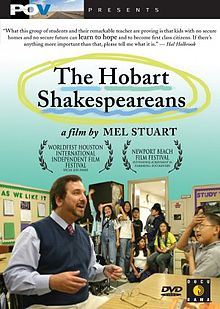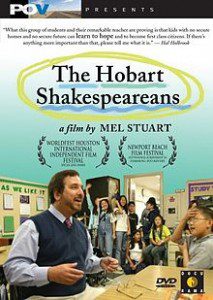
29 Mar TALL TALES: SHAKESPEARE AND PARROTS
TIO contributor Mark Stevens discusses and compares two documentary films, The Hobart Shakespearians and The Wild Parrot of Telegraph Hill.
From: The Department of Nourishment for the Soul
To: All Fans of Inspiring Documentaries
Re: Rafe Esquith & Mark Bittner
 Outliers and oddities both, two documentary films, The Hobart Shakespearians and The Wild Parrots of Telegraph Hill share a California backdrop and the remarkable ability of two very different men to look at a flock (kids in one case, birds in the other) and see the individuals within.
Outliers and oddities both, two documentary films, The Hobart Shakespearians and The Wild Parrots of Telegraph Hill share a California backdrop and the remarkable ability of two very different men to look at a flock (kids in one case, birds in the other) and see the individuals within.
I happened to catch both documentaries, on the same weekend, and the similarities whacked me over the head like the single-volume Complete Works of Shakespeare falling from the highest shelf.
In The Hobart Shakespearians public-school teacher, Rafe Esquith, empowers his grade-school students to read at extraordinary levels. They all play guitar. They all work together. And, they all produce Shakespeare plays together. They have visits from the likes of actor Sir Ian McKellan — all in the confines of a fairly ordinary looking, and quite large, elementary school in Los Angeles.
Reminder: This is a Los Angeles public school. These are poor kids and many are non-English speakers (at least at first). The driving force (that’s an understatement) that changes these students is Rafe Esquith. He treats them (gasp, horror) as individuals and knows their stories. He pulls them together as a unit and helps them understand how they can help each other as a group. In the film, Esquith not only teaches his students, but the audience as well, how one man with high standards and an innate ability to connect with children, can change their lives.
Esquith insists that reading is a “thrilling adventure,” and he makes it so. His class reads the classics, like To Kill A Mockingbird and The Adventures of Huck Finn and through them relates their own stories and “struggles of growing up.” His methodology is so powerful, that students sob as they listen to a classmate read aloud from Huck Finn.
“Powerful stuff,” says Esquith, before he begins posing rhetorical questions to the class about Huck, while magically making them reflect on their own self identify. “What he’s really going to be is he’s going to be himself,” Esquith emphasizes and adds, “He’s not going to let society tell him what to do. And isn’t that a decision all of you have to make? Society is going to tell you how to dress, what to play, what pop group to listen to, how to cut your hair. Each of you is so individually special, I hope you guys make these kinds of decisions [for yourselves] in your life.”
Chances are you will see few teachers as connected with his flock as Esquith and, of course, you wonder what it would take to multiply him times 7.2 million (number of teachers in the United States). If you could do so, there would be no need for national testing or school accountability systems. If you could do so, our world would be a very different place in every way imaginable.
 A few hundred miles north, in The Wild Parrots of Telegraph Hill in San Francisco, Mark Bittner also searches for what makes each individual different – but this time within a flock of parrots. While others see a “flock”, Bittner sees individual birds with individual stories, personalities, desires and yearnings. He knows their habits, their love interests, their quirks. He spent (get this) six years getting to know them. They have names and back stories. They are his characters.
A few hundred miles north, in The Wild Parrots of Telegraph Hill in San Francisco, Mark Bittner also searches for what makes each individual different – but this time within a flock of parrots. While others see a “flock”, Bittner sees individual birds with individual stories, personalities, desires and yearnings. He knows their habits, their love interests, their quirks. He spent (get this) six years getting to know them. They have names and back stories. They are his characters.
Early in the film, Bittner questions the “wild” nature of the parrots. He wonders, how they can be wild, if he takes care of them, offers them food and has developed relationships with them. (Some of the birds seem to enjoy the human connection; others hold back.) Through showing the parrots and their daily interactions, Bittner gently defends their wild status. It is evident by the film’s end, that these birds are both in control and subject to the natural forces all around them — man and wildlife alike.
I will say that Bittner’s relationship with the birds, and the government, does get complicated, but so is the idea of “wild” parrots in the city. Ultimately, Wild Birds is as much about Bittner as it is about the flock, just as The Hobart Shakespeareans is as much about Esquith, as it is about his students.


Sorry, the comment form is closed at this time.